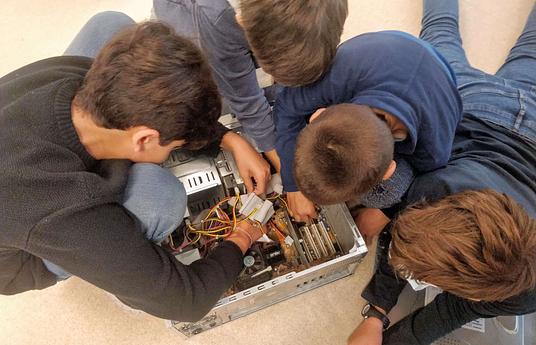Growing need
Over the past eight years, increasing numbers of schools are reporting the onset of anxiety and disengagement in younger students, often the exacerbated by trauma. This has been intensified by the isolation enforced by COVID-19 pandemic school shutdowns.
HoL Primary
Hands on Learning Primary is an evidence-based practical program specifically tailored to build positive wellbeing and foster middle years students’ personal and social capabilities.
Readily scalable, this junior version of Hands on Learning now runs in more than 34 primary school settings across Queensland, Tasmania, New South Wales and Victoria in Australia.
The ‘release valve’ of time out of regular class and different ways to learn, builds confidence and self-esteem, and re-ignites interest in learning.
Fostering social and emotional learning
Hands on Learningcreates a safe supportive space, with new ways to experience success. This strengths-based methodology fosters strong relationships, teamwork, and supports students to develop their communicationskills and a toolkit of strategies to manage their emotions and social interactions.
Participants’ motivation, attendance, self-esteem and confidence increase, creating the platform for greater engagement in other learning and a stronger sense of their own potential, at school and in the workforce.
Reflective practice
Hands on Learning features a clear framework with a carefully structured ‘Shape of the day’ with expectations, boundaries and consistent parameters.
Reflective practice is at the heart of the HoL methodology and ‘Focus Plans’ are used to support progress by fostering the personal and social skills essential for success at school (and in life).
Habits and attitudes influence the way students feel and behave. Focus Plans are purposefully integrated into Hands on Learning to provide students with strategies to make good decisions, and re-establish behaviours and attitudes for positive and sustainable use.
Hands on Learning equips students with the skills they need to engage and participate successfully in the regular classroom, make and keep friends, feel and show empathy, regulate behaviour, and establish and maintain relationships .
Rigorous impact measurement
Partner schools utilise extensive tools to measure the impact of HoL from the perspective of students, teachers and parents (see media section).
Schools access the HoL methodology via an online portal featuring live daily records of student intake/exit, attendance, downloadable resources that can be edited to suit individual school needs, and best practice captured in eLearning platforms such as toolbox talk, podcasts, webinars, videos and network newsletters.
Building school capacity
Save the Children’s Hands on Learning School Support Teamwork closely with partner schools to build school capacity.
Starting with support to recruit, train, and strengthen artisan-teacher skills, our team of experts remain in regular contact with partner schools, monitoring the health of the program, supporting professional development and providing practice quality updates to school leadership.
Partner schools access valuable opportunities to share ideas and inspiration as part of an established network of practitioners across Australia.
“HoL is all about self-esteem and building the strong wellbeing foundation critical for learning. We were finding kids of a young age starting to disengage, self-harm, not believing in themselves. The trauma some of these kids have seen effects their lives and when we give them hope of something better, a belief in what they can achieve, they strive to turn their lives around. It’s the structure, method and training that’s behind it that makes Hands on Learning so successful. Our staff have been able to pick it up and run with it immediately. The reflective practice at the beginning and end of the day gives students the opportunity to reflect on what they have achieved. When students are older learning achievements don’t come as quickly. HoL Primary allows you to have quick wins every day – it’s a brilliant program. I’d love to run a whole school like this, that would be my dream, that’s how powerful Hands on Learning it is.”
Jodi May, Principal, Heywood Consolidated School, Australia
“We have a group of children who struggle in terms of their behaviour and ability to engage in academic tasks. They started Hands on Learning this year and what we are seeing is the most positive thing imaginable. These kids are having explicit social norms modelled to them through HoL activities. We are seeing positive relationships being created with each other, outside their peer groups, with staff, and a huge connection to school."
Joe Ewing, Principal, St Pius X Parish School, Warrnambool, Australia



